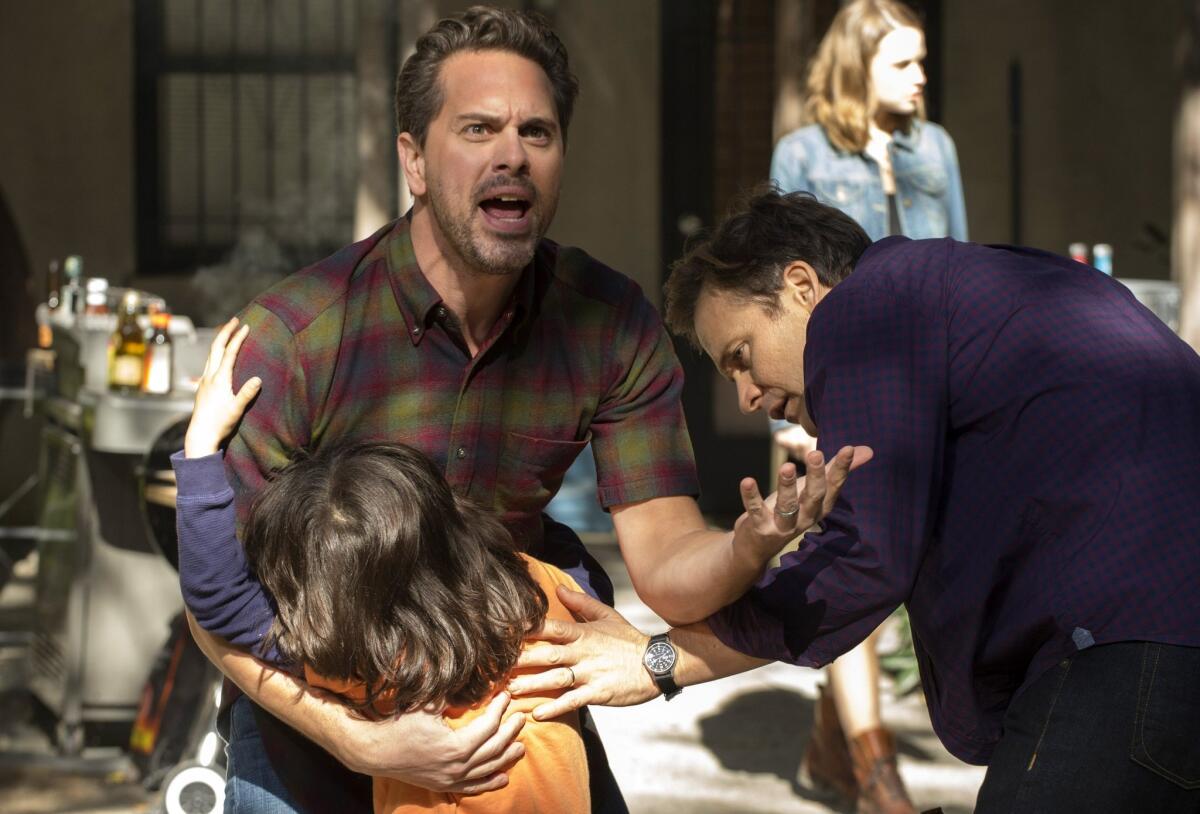Review: ‘The Slap’ may challenge notions of fault, but abuse is abuse

- Share via
Adapted by playwright Jon Robin Baitz from a 2011 Australian miniseries, NBC’s “The Slap,” which premieres Thursday, purports to address the complexities of parenting, the dangers of self-righteousness and the conflict between thought and deed.
But two hours in, it seems to be mostly about anger. Male anger in particular.
Each of the NBC miniseries’ eight episodes is told from the point of view of a particular character, so female anger and/or other gender-neutral emotions will no doubt be addressed; with multi-sided narration, it’s difficult to gauge what the overall tone of “The Slap” will be.
Yet for all the cinematic shadowboxing that occurs in the first two episodes of “The Slap,” the basic story around the central action is quite simple: An abusive man abuses, and everyone tries to pretend that something more complicated has happened.
Directed by “The Kids Are All Right’s” Lisa Cholodenko, the first hour follows Hector (Peter Sarsgaard). Introduced with the same sort of arch, self-justifying narration of the novel-based Australian version, he is a devoted family man and civic-minded New York City official. Hector is also so passive-aggressive that we meet him fantasizing about his teenage baby-sitter, Connie (Makenzie Leigh), and then congratulating himself for straying only in imagination.
This is not true, of course. Much of the first hour involves Hector pursuing the 18-year-old, who is, predictably, throwing herself at him.
Squirming in the protective bubble of a lovely brownstone, Hector is quietly angry because he is turning 40, he didn’t get a long-expected promotion (it went to a woman), and his wife, Aisha (Thandie Newton), is too busy prepping his birthday party to pay much attention to him.
On the day of the party, we meet the rest of the group: There’s Aisha’s best friend, Rosie (Melissa George, reprising her role from the Australian version) and her husband, Gary (Thomas Sadoski); Anouk (Uma Thurman) and her young boyfriend, Jamie (Penn Badgley); Hector’s parents, Manolis (Brian Cox) and Koula (Maria Tucci), and last but certainly not least, cousin Harry (Zachary Quinto) and his wife, Sandi (Marin Ireland).
It’s quite a cast and a good thing too, considering the almost uniformly absurd character types they miraculously manage to animate. Koula is the controlling Greek mama, dismissive of all but her own blood and Manolis her wrangler. Rosie still nurses her ill-behaved 5-year-old, Hugo (Dylan Schombing), while Gary is the defensively-offensive “artist type” everyone loves to hate. Even when he’s up against a preening macho man like Harry, who roars up in a Range Rover and never stops roaring.
It will surprise no one to learn that the perpetrator of the title’s action is Harry, its victim Hugo. Angry, repetitively destructive and seemingly incapable of responding to direction, Hugo is not just a spoiled kid having a bad day. Presumably everyone at the party has met Hugo and his obviously long-standing issues, yet no one seems prepared to deal with the inevitable reactions of a behaviorally challenged kid at a large, boozy, mostly adult event. (At one point, Hector takes an iPad away from Hugo; who on Earth takes an iPad away from a kid like Hugo?)
Likewise, Harry swaggers in, brows set to glower, openly contemptuous of everyone who isn’t rich and/or Greek. He looks exactly like he’s about to hit someone, and then he does.
Where the blow in the Australian version was a sudden and possibly isolated event, in the NBC version it is far more prolonged. First, Harry yells at Hugo, grabs him by both shoulders and shakes him. Then, when the child kicks back, Harry slaps him. Very, very hard.
Only the completely colorblind could view the scene in terms of gray. Harry and Hugo are mirror images of each other — the critical difference being that Harry is an adult and Hugo is a child.
And, as we learn in the second episode, children are not the only people Harry physically assaults. The second hour is all about Harry and his anger, which he glories in even as he struggles to “control” it. Though one key scene is much less overt than in the Australian version, it’s violent enough to expose something far more dangerous than arrogant and quick-tempered.
The mocking tone of the narrator reminds the viewer that each episode is tinged with, though not confined to, the perspective of a single character. Unlike “The Affair,” which seesaws ambiguously between the memories of two suspect viewpoints, events in “The Slap” happen in real time. That fact makes it trickier and more ambitious — a morality play, with top notes of Greek tragedy, which remains purposefully coy about its morality.
The series admirably challenges the notion of fault, exploring the many sins and secrets dislodged by a single act. But it’s important to remember that not all sins are created equal.
Obsessive and indulgent parenting is irritating, flirting with the young baby-sitter unadvisable, but dominating people through physical force is almost always indefensible. And very often a crime.
--------------------
‘The Slap’
Where: NBC
When: 8 p.m. Thursday
Rating: TV-14-DSV (may be unsuitable for children under the age of 14 with advisories for suggestive dialogue, sex and violence)
More to Read
The complete guide to home viewing
Get Screen Gab for everything about the TV shows and streaming movies everyone’s talking about.
You may occasionally receive promotional content from the Los Angeles Times.







